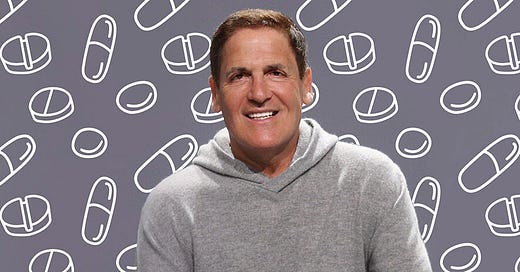“What we spent $160,000 on at the [Dallas Mavericks], we could have purchased for $19,000 for Cost Plus,” - Mark Cuban
The cost of healthcare in the U.S. is, appalling. The average American spent $13,493 on healthcare alone in 2022, or around 11.6 percent of the median income. We spend twice as much on healthcare as the average of our peer countries.
And medicine is a huge chunk of that cost, 11.5% as of 2019. Often for life-preserving medicine such as insulin, which as of 2020 was 8X higher than in 32 high-income comparison nations combined. Thankfully, the cost of insulin has come down.
Still, the high price of medicine here in the U.S. has many seeking new solutions (even going to Canada).
"Healthcare, healthcare, healthcare. It's the only company I've ever put my name on." - Mark Cuban
Transparency and Trust
…Are two things in short supply in the medical market. And two reasons why Mark Cuban and Alexander Oshmyansky started CostPlusDrug at the beginning of 2022.
CostPlusDrug is a direct-to-consumer pharmacy, offering more than 800 generic drugs that treat common diseases like cancer, dementia and leukemia, among others at far lower prices than most retail pharmacies. How substantial? Imatinib, a leukemia medication with a retail price of more than $2,500, is just $14.40 at Cost Plus Drugs, regardless of whether you have health insurance.
How do they do this?
By removing the ‘middleman’, Pharmacy Benefit Managers (PBMs) who negotiate between drug companies, insurers, and pharmacies while often keeping the savings they negotiate (rebates and discounts) for themselves as profit.
CostPlusDrug replaces this system with transparent pricing. The company sells each drug at a fully disclosed price plus a 15% markup, a $5 pharmacy service fee, and a $5 shipping fee
For anyone who has spent time fighting with their insurance company for coverage or had to juggle the high out-of-pocket cost of a drug they need within a tight budget; this can be a lifesaver.
Purpose Can Be Profitable
Helped a bit by the celebrity of Mark Cuban and word-of-mouth, CostPlusDrugs has taken off quickly.
Surpassing $25 million in sales in its first year (2022) and acquiring 1 million customers within nine months.
And this year, they’ll start producing their own drugs beginning with sterile injections (Mar ‘24).
Meanwhile, its success is pushing the industry. CVS just announced it too will adjust pricing to a New Cost-Plus Model.
It isn’t sexy, but sometimes purpose is really seeing a problem in the market and setting out to fix it.
We started this company as an effort to disrupt the drug industry and to do our best to end ridiculous drug prices. Thanks for your support, and please let us know what you think!
CostPlusDrugs
founded in January, 2022 by investor Mark Cuban and Alexander Oshmyansky founder & CEO
works directly with drug manufacturers to bypass middlemen (PBMs) and lower prices.
For consumers, the price of each drug includes a 15% markup as a profit margin, a $3 pharmacy handling fee and a $5 shipping fee. Cost Plus also transparently displays what it pays for its medicines.
Currently offers 2,500 generic medications, available in all 50 states
Starting to manufacture its own generic medications, starting with sterile injectibles (as of Mar’ 24)
Revenue and sales are not reported publicly, however, stated ‘millions of prescriptions and customers have been filled’
PBMs the middlemen of medicine
Pharmacy Benefit Managers (PBMs) act as middlemen negotiating between drug companies, insurers, and pharmacies
PBMs create and update formularies of preferred drugs, with different prices and cost-sharing amounts that influence what beneficiaries pay out of pocket and which medications they can access through their insurance.
PBMs negotiate rebates and discounts for an insurance plan from drug manufacturers and determine the prices insurers pay and the payments pharmacies receive. PBMs can also take on the administrative role of directly reimbursing retail pharmacies on behalf of an insurer.
PBMs can drive up the cost of drugs through:
Keeping a portion of the rebates they negotiate for their own profit, rather than transferring those savings to the insurer
Spread pricing, when PBMs receive a higher payment from insurers for a drug than the amount the PBMs pay to retail pharmacies; profiting by capturing this difference.
Big Three PBMs—CVS Caremark, Cigna’s Express Scripts, and UnitedHealth’s Optum Rx—controlled 80% of the market in 2022, according to the Drug Channels Institute




